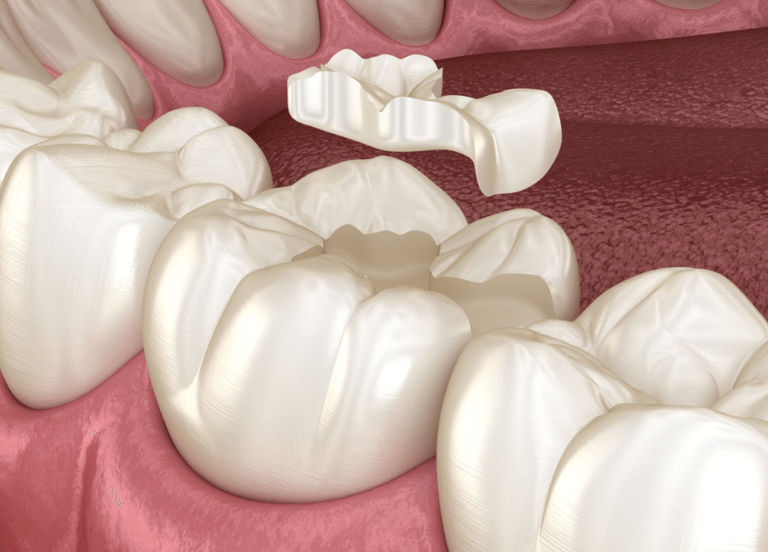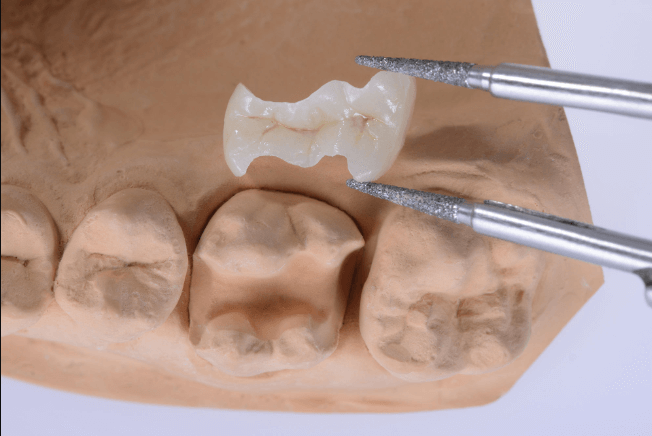Porcelain Inlay Recementation

What Is Dental Inlay Recementation?
A Porcelain Inlay is a custom-made dental restoration crafted from high-quality, biocompatible porcelain. It’s designed to fit precisely within the contours of a damaged tooth, restoring both functionality and aesthetics.
Over time, factors like wear and tear, improper bonding, or trauma can cause an inlay to loosen. Dental inlay recementation is the process of securely reattaching the inlay to its original position. This straightforward procedure not only restores the stability of the inlay but also protects your tooth from further damage and potential infection.
Before deciding on whether Dental Inlay Recementation are right for you, there are some things you should know:
- Who Needs Dental Inlay Recementation?
- Benefits Of Dental Inlay Recementation
- Alternative Treatments To Dental Inlay Recementation
- How Much Does Dental Inlay Recementation Cost?
- Steps In The Dental Inlay Recementation Procedure
- Frequently Asked Questions About Dental Inlay Recementation
If you have any further questions about Dental Inlay Recementation or other dental services offered at Atlas Dental, please contact us.

Free phone consultation
Have questions about tooth fillings? Schedule a free phone consultation with our Toronto dentist.

5 star google reviews
Our patients love us! See for yourself why more and more people are choosing Atlas Dental for their dental fillings.

Book Emergency tooth filling
Do you think you have cavities and need an appointment? Book an emergency tooth filling online.
Who Needs Dental Inlay Recementation?
You may require dental inlay recementation if you experience any of the following:
- Natural Wear and Tear: The bond holding the inlay can weaken over time due to biting, chewing, or teeth grinding.
- Tooth Decay: New cavities under the inlay can compromise its stability.
- Accidental Trauma: A sudden impact from sports or accidents may dislodge the inlay.
- Changes in Bite Alignment: Shifting teeth or dental work can affect how the inlay fits.
If left untreated, a loose inlay can expose the underlying tooth to bacteria, leading to decay or sensitivity. If you have further questions about Dental Inlay Recementation, please contact us.
Benefits of Dental Inlay Recementation
Choosing recementation offers several advantages:
- Preservation of Tooth Structure: Prevents further damage or decay.
- Restored Functionality: Allows you to bite and chew normally without discomfort.
- Aesthetic Appeal: Maintains the natural appearance of your smile.
- Prevention of Sensitivity: Covers exposed areas of the tooth, reducing pain or discomfort.
- Cost-Effective Solution: Avoids the expense of more invasive procedures like crowns or replacements.
If you suspect that your dental inlay is loose or dislodged, schedule an appointment with your dentist as soon as possible. If you have further questions about Dental Inlay Recementation, please contact us.

What Are the Alternative Treatments If I Do Not Choose Dental Inlay Recementation?
If recementation isn’t feasible, other options include:
- Dental Inlay Replacement: Crafting a new inlay if the existing one is damaged or ill-fitting.
- Dental Fillings: For smaller areas of decay or damage.
- Dental Onlays: For larger restorations that extend to the tooth’s cusps.
- Dental Crowns: For extensive damage requiring full-tooth coverage.
It’s important to note that each alternative treatment comes with its own considerations, benefits, and potential drawbacks. Dental professionals will carefully assess your oral health, the condition of the inlay, and the underlying tooth before recommending the most suitable course of action. If you have further questions about Dental Inlay Recementation, please contact us.
Cost of Recementation for Inlays/Onlays/Crowns/Veneers
The cost of a recementing an Inlay, Onlay, Crown or Veneer starts at $221 and up, depending on the amount of time it takes the dentist to perform this procedure. Normally, it takes 30 minutes, and would cost $221 for one. The codes relevant to dental crowns in the Ontario Dental Association’s Suggested Fee Guide appear as follows:
Recementation/Rebonding, Inlays/Onlays/Crowns/Veneers/Posts/Natural Tooth Gragments (single units only)
- 29102 – Two Unit of Time (30 minutes): $221
- 29103 – Three Unit of Time (45 minutes): $316
- 29104 – Four Unit of Time (60 minutes): $412
The recementation of single unit dental prostheses is usually considered a basic restorative procedure covered by your dental insurance. Be sure to find out from your dental insurance plan provider how much you are eligible for before going ahead with dental treatment. Your dentist can help you submit an predetermination to your dental insurance. Our fees are consistent with the ODA Fee Guide.
For patients without dental insurance, Atlas Dental is pleased to offer dental financing through iFinance Dentalcard. Affordable payment plans start at 7.95% for terms of 6 months to 6 years. To learn more about Dentalcard dental treatment financing, follow this link.
Steps in the Dental Inlay Recementation Procedure
The procedure typically involves these steps:
- Examination: The dentist evaluates the inlay and the tooth using a visual exam and X-rays.
- Cleaning: Any remaining adhesive or debris is removed from the tooth and inlay.
- Rebonding: Dental cement is applied, and the inlay is positioned carefully.
- Adjustments: The bite is checked, and necessary adjustments are made.
- Curing: The adhesive is hardened using a curing light for a secure bond.
This procedure is quick, usually taking 15–30 minutes, depending on the complexity. If you have further questions about Dental Inlay Recementation, please contact us.
Frequently Asked Questions About Dental Inlay Recementation
- How long does dental inlay recementation last?
With proper care, recemented inlays can last many years. Regular dental check-ups and good oral hygiene help maintain their longevity.
- Can I eat normally after recementation?
It’s best to avoid sticky or hard foods for 24 hours post-procedure. After that, you can resume your regular diet.
- Is dental inlay recementation painful?
No, the procedure is generally painless. If tooth sensitivity occurs, it typically subsides quickly.
- Can I use over-the-counter dental adhesive to fix a loose inlay temporarily?
While tempting, using over-the-counter adhesives is not recommended. Improper application can cause further complications and make professional recementation more challenging.
Dental inlay recementation is a simple yet effective way to restore the stability and function of your porcelain inlays. At Atlas Dental, we’re here to help with all your dental restoration needs. Contact us for more information or to schedule an appointment.

